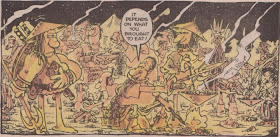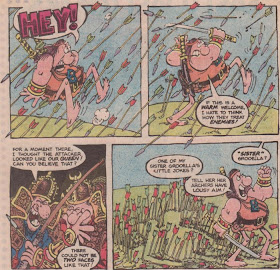By Sergio Aragones, Mark Evanier, Stan Sakai (lettering), and Tom Luth (coloring)
Published by Epic Comics, 1986

In the series' continued effort to give Groo more characters to play off of, this issue introduces his sister Grooella, who is a queen of some kingdom or other, with a castle and everything. But since she's in danger of losing that castle to an invading army, she takes the incredibly risky gambit of sending for her brother's help. While he travels to join her, he flashes back to her childhood, including the incident (which, if I remember correctly, is repeated in the Life of Groo graphic novel) in which he caused her flowing blonde locks to be transformed into the frizzy heap that currently decorates her dome. The fact that this is a happy memory for him gives us some insight into Groo's psyche:
.jpg)
As we've seen in the series (and specifically in this issue, when the messenger Grooella sends is repeatedly beaten whenever he asks somebody if they've seen Groo), Groo is hated and feared by pretty much everyone he comes across, yet this doesn't seem to bother him. He causes death, destruction and suffering everywhere he goes (this issue's title page being a particularly effective example, depicting a city he visited that seems to have been hit by a natural disaster, with buildings leveled, people and animals injured, bodies piled up, and people rushing to put out fires), but he seems to view it all as an honest mistake, just something unfortunate that happened while he was trying to help out. It's a fascinating level of obliviousness, and a necessary one if the comic wants to remain humorous, rather than a tragic story about a mentally deficient man who is justifiably loathed and despised by the entire world, never able to dig himself out of the hole of shame and disgust that his actions place him in.
No, Groo needs to remain happy-go-lucky to survive, and he does so here, excitedly rushing to her aid, yet still managing to cause her castle to be taken over by the invaders, in order to set up a big battle in the next issue. Sergio gets plenty of opportunities to throw in funny details, like the difficulty Groo has when coming up with ideas even when he was a kid:
.jpg)
.jpg)
Or some soldiers using one of Sergio's standard helmet designs to cook food:
.jpg)
And unless I hear otherwise, I'm going to assume the movie Hero was inspired by this issue:
.jpg)
On the topic of violence, it's notable that while the killings have become somewhat sanitized, with minimal blood and victims usually reacting by sticking out their tongues and clutching their chests, Groo is still quite lethal, as can be seen in this scene, in which he slices open at least three men with one swipe of his sword:
.jpg)
I love looking at all the little details of the book, whether in the midst of battle scenes, the background of landscapes, or the exchanges of dialogue and moments of character interaction. That richness is what always keeps me coming back for more.
Next: "The Siege!"
-----This issue's stats:
Recurring characters: Grooella, and Sage also appears in one of the flashbacks. I assume this is the first flashback to Groo's childhood, but later on, strips featuring "Lil' Groo" will show up from time to time, most of them featuring Grooella and either the Sage or Granny Groo, who apparently hasn't been introduced yet either.
Hidden message(s): Someday, I will start finding these... UPDATE: As reader Lee Menham points out in the letter column of issue #27, the text in the following caption (the very first thing seen in the issue, which makes my missing it kind of sad) can be rearranged to read either "Hidden Message: Naive Sister" or "It's Evanier's Hidden Message":
.jpg)
Moral: "Blood is thicker than water...so beware of thick relatives."
Spanish words: The army attacking Grooella's castle are called the Cominos, which might be a misspelling of camino, the Spanish word for road. Of course, it's also an island next to Malta, a valley in Italy, and another spelling of the spice cumin.
Running jokes: Groo can plainly see that the Cominos are a fierce band, and he was saying "Did I err?" even when he was a little kid.
Mark Evanier's job(s): Aide
Letter column jokes: Mark confirms that the Groo Crew (Sergio, Mark, Stan Sakai, and Tom Luth) appeared in the background of the Minstrel story in issue #15 and also as attendees of Arcadio's wedding in #11. A reader named Anthony Haagsma confesses that he got his letter printed in #15 by saying he thought Groo was stupid, and apologizes for the terrible thing he has done. Mark responds by "complaining" that they only print complimentary letters because that's pretty much all they get, and sort of calls for more critical letters, which makes me curious to see if more of them (real or fake) show up in future issues. Mark also announces that the next issue will be the last time he defines mulch in the letter column (it didn't stick though), and makes a big deal about it, saying to reserve extra copies and that he doesn't know why anyone else should bother printing other comics that month, which was a good joke about hype for dumb events in comics even back in 1986.
.jpg)
Moral: "Blood is thicker than water...so beware of thick relatives."
Spanish words: The army attacking Grooella's castle are called the Cominos, which might be a misspelling of camino, the Spanish word for road. Of course, it's also an island next to Malta, a valley in Italy, and another spelling of the spice cumin.
Running jokes: Groo can plainly see that the Cominos are a fierce band, and he was saying "Did I err?" even when he was a little kid.
Mark Evanier's job(s): Aide
Letter column jokes: Mark confirms that the Groo Crew (Sergio, Mark, Stan Sakai, and Tom Luth) appeared in the background of the Minstrel story in issue #15 and also as attendees of Arcadio's wedding in #11. A reader named Anthony Haagsma confesses that he got his letter printed in #15 by saying he thought Groo was stupid, and apologizes for the terrible thing he has done. Mark responds by "complaining" that they only print complimentary letters because that's pretty much all they get, and sort of calls for more critical letters, which makes me curious to see if more of them (real or fake) show up in future issues. Mark also announces that the next issue will be the last time he defines mulch in the letter column (it didn't stick though), and makes a big deal about it, saying to reserve extra copies and that he doesn't know why anyone else should bother printing other comics that month, which was a good joke about hype for dumb events in comics even back in 1986.

This makes the first of these where I actually own the issue. Though like you I'm looking forward to when you get to the addition of Rufferto...
ReplyDelete